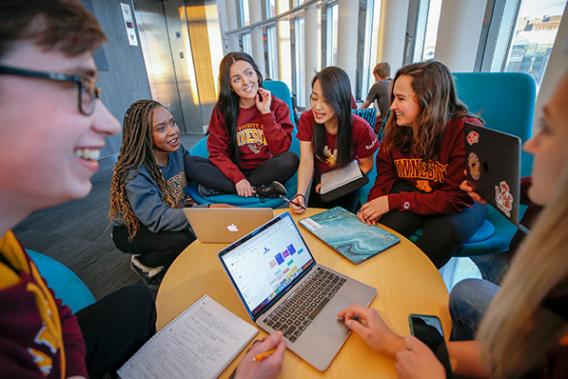Undergraduate overview
Our undergraduate programs aim to advance knowledge of physical activity and human movement. Students in our School engage in internships, practicums, research, and other hands-on learning opportunities to apply what they’ve learned in the classroom. These experiences and our programs prepare students for a variety of career paths in research, the health and wellness industry, and in sports.

University honors program
The University Honors Program (UHP) provides students with an enriched learning environment. Honors students can be admitted to the School of Kinesiology.
Honors students admitted to the School of Kinesiology take part in directed research and thesis writing in the physical activities sciences. Faculty provide honors students with a challenging learning experience. Learn more about being a School of Kinesiology honors student.
Financial aid
The School, College, and University all offer financial aid opportunities for students. Use the following resources to see available funding opportunities:
Research opportunities
The School of Kinesiology houses 14 labs and centers that specialize in a wide variety of research. Much of the School's research is interdisciplinary and collaborates other with life sciences, such as medicine, neuroscience, and epidemiology. Our research also fosters links with business, education, and social sciences. Review the research page for more information.
Teaching Labs
The School also has three teaching laboratories. Our teaching labs provide students with the latest laboratory equipment and experiences. These labs are open to undergraduate and graduate students.
Human Performance Teaching Laboratory (HPTL): The HPTL provides students the latest laboratory equipment and experiences in biomechanics and human and exercise physiology. The HPTL also has a small classroom for laboratory instruction.
Physical Activity and Sport Science (PASS): The PASS lab researches the broad context of human physical activity. Physical activity is movement that results in the body working harder than normal through increased energy expenditure beyond resting levels.
Movement Science Teaching Lab (MSTL): The MSTL houses a force plate and several wearable movement sensors. It's used in conjunction with the HPTL to deliver courses in movement science. The courses include aspects of biomechanics, engineering, neuroscience, and psychology.
Undergraduate research opportunities program
Undergraduate students are encouraged to take part in research projects. Students should start this process by reviewing the Undergraduate Research Opportunities Program (UROP). UROP facilitates undergraduate participation in faculty-mentored research projects. The programs are flexible, allowing research study in any academic area University-wide.
Study abroad
Studying away from campus
Students can complete a study abroad program during their undergraduate or graduate studies. Visit the Learning Abroad Center to review the learning abroad opportunities that are tailored to sport management BS students, and opportunities that are tailored to kinesiology BS students.
Student organizations
Joining a student organization is a great way to get involved, meet new friends and contacts, and enhance your UMN experience. It can also give you a valuable advantage in your career, allowing you to make connections and gain work experience.
Kinesiology students often find value in the following student organizations
- Public Health Advocacy Student Alliance
- Pre-Physical Therapy Club
- School of Kinesiology Student Council
Physical activity and health promotion students often find value in the following student organizations:
- Nutrition Experiential Learning and Advocacy (NELA)
- Food Science and Nutrition Club
- Student Health Advisory Committee
- Wellness and Culture Club
Sport management students often find value in the following student organizations:
Diversity statement
The College of Education and Human Development Diversity statement:
We affirm the contributions of all people in our community. Diversity and equity are at the core of our mission in the College of Education and Human Development.
We explicitly reject bias, discrimination, and exclusion on the basis of race, color, creed, religion, national origin, gender, age, marital status, disability, public assistance status, veteran status, sexual orientation, gender identity, or gender expression.
We all are responsible for recognizing, confronting, and addressing bias and discrimination and diligently working for positive change in support of equity and diversity.
CEHD Graduate and Professional Education diversity statement
May 2, 2017, approved by CEHD Directors of Graduate Studies